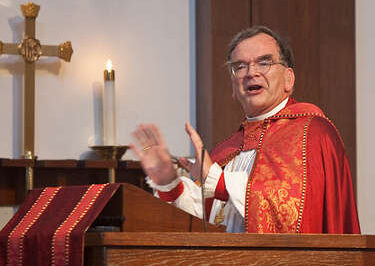
The document was signed during the ACNA Inaugural Provincial Assembly, which drew some 800 participants to Bedford, Texas, this week. Pittsburg Bishop Robert Duncan, who on Wednesday will be installed as the group’s first archbishop, said the formation of ACNA is part of a “reformation” marked by a return to orthodox Christianity within the 77 million-member Anglican Communion and beyond.
“Our God is up to something very big, both with us and with others,” Duncan said Monday. “The Father truly is drawing His children together again in a surprising and sovereign move of the Holy Spirit. He is again re-forming His church.”
On Tuesday, Saddleback pastor Rick Warren addressed the assembly, telling particpants to love one another but not the world’s values, the Associated Press reported. Other non-Anglican participants include Metropolitan Jonah of the Orthodox Church, the Rev. Samuel Nafzger of the Lutheran Church, Missouri Synod, and Bishop Kevin Vann of the Catholic Diocese of Fort Worth, Texas. The assembly ends on Thursday.
The formation of ACNA, said to represent some 100,000 Anglicans in 700 parishes, is the latest response to liberal moves within the Episcopal Church that culminated with the ordination of an openly gay bishop in 2003. Since then, roughly 200 congregations have left what had been the only U.S. branch of the Anglican Communion, ACNA leaders said.
Most of the defectors, including several charismatic parishes, have aligned with conservative dioceses in Africa, Southeast Asia and Latin America, where Anglicanism is experiencing the most growth.
Leaders said the formation of ACNA relieves North American congregations from having to seek oversight overseas. While drafting its constitution, ACNA worked with bishops who have taken in the defecting parishes and dioceses to develop protocols for those congregations to ultimately align with the new North American province.
“Each time province’s table will be a little different, but the ultimate goal is for these protectorates to end and for all of the churches to become full members and fully participating in the Anglican Church in North America as their province,” said the Rev. Phil Ashey, who helped draft the ACNA constitution and serves as chief operating officer for the American Anglican Council, a founding member of ACNA. “I think most of them are looking for North American bishops [who are] closer to home and closer therefore to their immediate needs and concerns.”
The new Anglican province replaces the Anglican Communion Network, one of several groups that emerged in the last five years to unite breakaway Episcopal churches. ACNA will combine eight diverse networks, including groups that hold opposing views on women’s ordination.
Ashey said ACNA will not impose one position on divisive issues such as women’s ordination, but that remains a thorny issue for the new church. Duncan said women may be ordained as deacons and priests within the ACNA, but not as bishops because the rest of the Anglican Communion sees ordination of women as bishops as “a sad and arrogant American approach,” according to USA Today.
“The bishop is the symbol of the diocese and putting someone other dioceses do not recognize as capable of holding the office in the post is divisive in the international church,” Duncan said.
Ashey noted that the new constitution emphasizes evangelism and missions, characteristics he says the Episcopal Church neglected. “In our articles, we … talk about extending the kingdom of God by so presenting Jesus by the power of the Spirit that people would come to know Him so everyone will come to know Him as Lord,” he said.
“That language is exactly the kind of language the Episcopal Church has not only refused to affirm when presented to it at general convention, but which the Episcopal Church has repudiate by its actions and its focus on everything but leading people into a personal relationship with Jesus Christ and the transforming power of the Holy Spirit.”
Duncan said the head of the Anglican Communion, the Archbishop of Canterbury Rowan Williams, is sending someone from his staff to this week’s meetings, which he said indicates that “we are part of the family,” USA Today reported.
Although Williams does not formally recognize the new church, nine of the Anglican Communion’s 38 provinces sent delegates to the inaugural assembly, with several previously indicating that they would immediately recognize the group.
Observers say full recognition may take as long as a decade, after the ACNA has been acknowledged by two-thirds of provinces in the church.
Some detractors say the new group will splinter apart because it comes out of a schism, but Jeff Walton, director of Anglican Action for the Institute on Religion and Democracy, said there are positive signs that it will survive as a viable expression of Anglicanism in North America.
“What we’re seeing is this body come together based on a number of disparate groups, of different theologies and different experiences that are coming together for the first time and uniting rather than dividing,” Walton told Charisma. “I think that’s pretty positive.”
The jurisdictions that have joined to form the 28 dioceses and dioceses-in-formation of the Anglican Church in North America are: the dioceses of Fort Worth, Pittsburgh, Quincy and San Joaquin; the Anglican Mission in the Americas (including the Anglican Coalition in Canada); the Convocation of Anglicans in North America; the Anglican Network in Canada; the Reformed Episcopal Church; and the missionary initiatives of Kenya, Uganda and South America’s Southern Cone. The American Anglican Council and Forward in Faith North America also are founding organizations.







Leave a Comment
You must be logged in to post a comment.